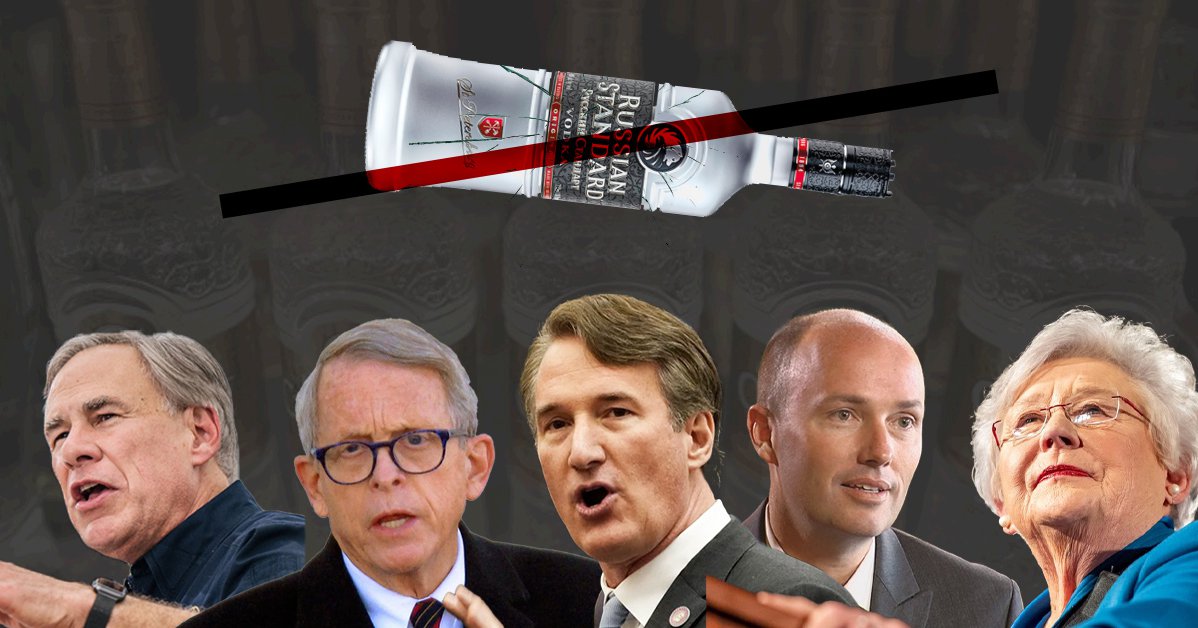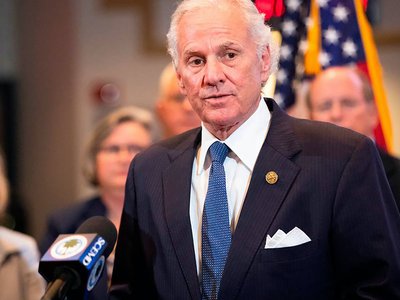In an act of solidarity with Ukraine, Gov. Greg Abbott asked Texas retailers Saturday to voluntarily remove all Russian products from their shelves.
Abbott tweeted that he had made the request of members of the Texas Restaurant and Texas Package Stores associations, as well as all other retailers. “Texas stands with Ukraine,” he wrote.
The request came days after Russia began its assault on Ukraine in Europe’s largest ground offensive since World War II. Ukraine’s health minister said Saturday that 198 people, including three children, had been killed and more than 1,000 wounded.
Abbott’s tweet was met with mixed reviews, with some replies calling it “performative” and “pointless” because the products were already paid for.
But others, including Jason Villalba, CEO of the Texas Hispanic Policy Foundation and Republican former state representative, were quick to thank Abbott for his efforts.
“We must stand with our brothers and sisters in Ukraine,” Villalba tweeted. “Every measure helps, especially those that impact the pocketbook.”
Restaurants ready to support
Some Texas restaurants have already started replacing Russian products on their own accord and many others will likely be on board with the action, said Emily Williams Knight, president and CEO of the Texas Restaurant Association.
“Restaurants just continue to stand up,” Knight said. “I’m humbled by how they pulled together and how they continuously support their community here in Texas and abroad when they’re still clearly in their own crisis trying to come out of the impact of COVID-19.”
Knight said the association is in solidarity with Ukrainians and told restaurants it would support them if they replace Russian imports of alcohol or food with alternatives.
Knight said the past few years have been tough for restaurants, but through it all, the group’s members support others, whether it be an ice storm or the situation in Ukraine. She said it’s too early to see what the impact of the conflict in Ukraine will be on restaurants — the association is watching how the rising cost of fuel will affect the cost of supplies.
“Now, I think what you’ll see is they’ll come together again to support Ukraine and to ensure that they’re doing their part and frankly whatever they can do to be supportive in this incredible tragedy,” she said.
Lance Lively, executive director of the Texas Package Stores Association, said in a written statement that the group sent its prayers to those who are suffering.
“TPSA members are proud to support the people of Ukraine and stand ready to support economic sanctions by removing Russian imports from our stores,” Lively said.
In Oak Lawn, Alexandre’s bar said in a Facebook post it was getting rid of its Russian spirits and would have Ukrainian vodka next week. The bar also introduced a shot whose name was an expletive-laden message to Russian President Vladimir Putin.
Texas barbecue restaurant owner Skeeter Miller called the action “a great move” and said he doesn’t have an issue with pulling Russian products off the shelves.
Miller said he considered the cost of pulling products — mainly alcohol — off the shelves, “but this is a serious situation.”
On Saturday afternoon, he said all six restaurants in his 47–year-old business, The County Line, had already been told to pull Russian vodkas. Miller has two locations each in Austin and San Antonio and one in El Paso, as well as a restaurant in Albuquerque, N.M.
”We’re sick about what’s going on over in Ukraine, but we’re here to support in any way that we can,” Miller said.
‘This is our sanction’
Several governments around the world have made the same request of their businesses, while some restaurant and bar owners took it upon themselves.
The Jacob Liquor Exchange in Wichita, Kan., removed more than 100 bottles of Russian vodka from its shelves and stored them in the backroom, even pouring some of it on the ground.
“I guess this is our sanction … and this may be small, but every small thing makes a difference,” store partner Jamie Stratton told KSNW-TV. “But I’m not going to put it on the shelves. There’s no reason for it to be here. We’re not supporting them.”
In Bend, Ore., a bar owner filmed himself pouring out all of his Russian vodka.
“Russia is acting as though it’s 1939 and going into Europe with a full force that they have in the Ukraine,” Bill McCormick, owner of Pine Tavern, told KPTV-TV. “I am so concerned about it metastasizing into other countries.”
In Ontario, Finance Minister Peter Bethlenfalvy directed the provincial Liquor Control Board to have stores remove Russian vodka and other alcoholic products, The Canadian Press reported.
“Ontario joins Canada’s allies in condemning the Russian government’s act of aggression against the Ukrainian people and we strongly support the federal government’s efforts to sanction the Russian government,” Bethlenfalvy said in a written statement.
British Columbia ceased imports of Russian alcohol entirely, according to Deputy Premier Mike Farnworth.
“Our province stands with those who understand Europe’s peace following two world wars depends on respecting international law,” he told The Canadian Press.
COLUMBUS, Ohio — Ohio Gov. Mike DeWine on Saturday ordered the state Commerce Department to stop the purchase and sale of all vodka made by a Russian-owned company in response to the country’s attack on Ukraine.
The governor’s order only applies to products made by Russian Standard, as it is the only Russian-owned vodka sold in the state, according to a news release from DeWine’s office. It is sold under the names Green Mark Vodka and Russian Standard Vodka.
Other brands of vodka sold in Ohio, including those with Russian names, are bought from non-Russian distilleries, the release states.
The Ohio Division of Liquor Control estimates that about 6,400 such bottles sit on the shelves of the state’s 487 liquor agencies. DeWine’s directive came as governors in other states called for similar actions.
Cleveland.com and The Plain Dealer reached out to Russian Standard for comment.
DeWine also declared Sunday to be a statewide Day of Prayer for the people of Ukraine. The Ukrainian flag will fly at the Ohio Statehouse and the governor’s residence in Bexley to show support for those under Russia’s attack and for Ukrainians who live in Ohio, according to the release.
The governor and First Lady Fran DeWine will also attend a church service Sunday morning at St. Andrew Ukrainian Catholic Church in Parma.
In response to Russia’s invasion of Ukraine, Gov. Spencer Cox issued an executive order on Saturday to remove all Russian-produced and Russian-branded products from state liquor stores.
The executive order will also require the Governor’s Office of Economic Opportunity to review state procurements for any other economic relationships with Russia, according to a news release from the governor’s office.
Russia launched its attack on the Eastern European country early Thursday, and the governor condemned the attack in a Tweet posted from his official account earlier this week.
“Russia’s ruthless attack on a sovereign nation is an egregious violation of human rights,” Cox said in the release. “Utah stands in solidarity with Ukraine and will not support Russian enterprises, no matter how small the exchange.”
According to the order, Utah will take “whatever measures possible” to support the people of Ukraine, and Russian-branded products will not return to state liquor stores until the order is rescinded.
Sunday afternoon, Virginia announced its state-run alcoholic beverage stores would take Russian-based vodka brands off store shelves. Later on Sunday, Maryland’s Montgomery County decided it would do the same.
In Virginia, the pressure to pull the bottles started to build on Saturday.
“In the spirit of Gov. Youngkin’s call for decisive action in support of Ukraine, Virginia ABC is removing Russian-sourced vodka brands from our store shelves,” the store said Sunday via an email blast and in a Facebook post.
The seven brands that will no longer be available at Virginia ABC stores are:
-Beluga
-Hammer & Sickle
-Imperia
-Mamont
-Organika
-Russian Standard
-ZYR
The agency, which runs nearly 400 stores across the state, said that brands with Russian names but which are based elsewhere, such as Stolichnaya and Smirnoff, will remain on shelves.
The state has a monopoly on retail liquor sales, so the decision to remove these brands will affect every store throughout the commonwealth.
Youngkin said Saturday that the “invasion of Ukraine by Soviet dictator Vladimir Putin cannot stand,” before announcing a series of actions that would cut Virginia’s ties with Russia.
Those included ordering a review to determine if any state tax dollars are spent on goods and services from Russian-based companies, and asking the cities of Norfolk and Roanoke to end sister city partnerships with Russian cities.
Youngkin also wants the Virginia Retirement System Board of Trustees and university endowment funds to divest any holdings it has of the Russian ruble, and any securities it has in Russian companies.
Changes in Maryland
As the news in Virginia broke, stories of a similar effort started to bubble up across the Potomac River in Maryland.
UFCW Local 1994, the union that represents public employees in Maryland, asked Montgomery County Executive Marc Elrich and the county’s Alcohol Beverage Services to “cease stocking Russian-brand vodka and other products in our county’s retail liquor stores.”
The county’s stores stock a number of the same brands noted in Virginia’s decision.
“We don’t want to touch the stuff right now,” union President Gino Renne said in a news release.
“Ukrainians are being hunted and killed by the government that Russian brands represent. These bottles should come off the shelves today. It is a small gesture of support and an opportunity to educate the public on what is happening when they see these brands are gone.”
By Sunday evening, Elrich released a statement saying Montgomery County would stop selling Russian-made alcohol.
“In solidarity with the people of Ukraine, all products produced in Russia have been removed,” the county leader said.
In addition, restaurants and bars in the county, who must order their stock from the ABS, will not be able to order the Russian-made products. But the county’s cessation order does not prevent those locations from selling vodka they already have on hand.
Alabama Gov. Kay Ivey is ordering Russian liquor be removed from state-owned liquor stores.
In a letter to Mac Gipson, administrator of the Alabama Alcoholic Beverage Control Board, Ivey said the move is designed to show “solidarity with the people of Ukraine,” following the Russian invasion of the country.
“This is a small, but meaningful way to take action and show the people of Ukraine we support them while also firmly stating our opposition to the unnecessary humanitarian crisis Russia has inexcusably created. I encourage all Alabama citizens and businesses to explore ways they can show support for Ukraine and discourage Russia for continuing this unreasonable siege on a neighboring country,” Ivey said in a statement.
The order applies to all Russian-sourced liquor products sold at ABC stores throughout the state. It does not apply to Russian-themed liquor products from other nations.
The removal is in effect until “further notice.”
“It is my hope, by taking this action, the State of Alabama may contribute to Russia’s justly deserved – and increasing – economic isolation,” Ivey said.
ABC operates more than 230 liquor stores across the state.
Ivey’s move comes after similar moves by other governors – including those from Utah, New Hampshire, Ohio and Pennsylvania - to remove Russian liquors from state stores. The move is mostly symbolic as only 1.2% of U.S. vodka imports came from Russia in the first half of 2021.






